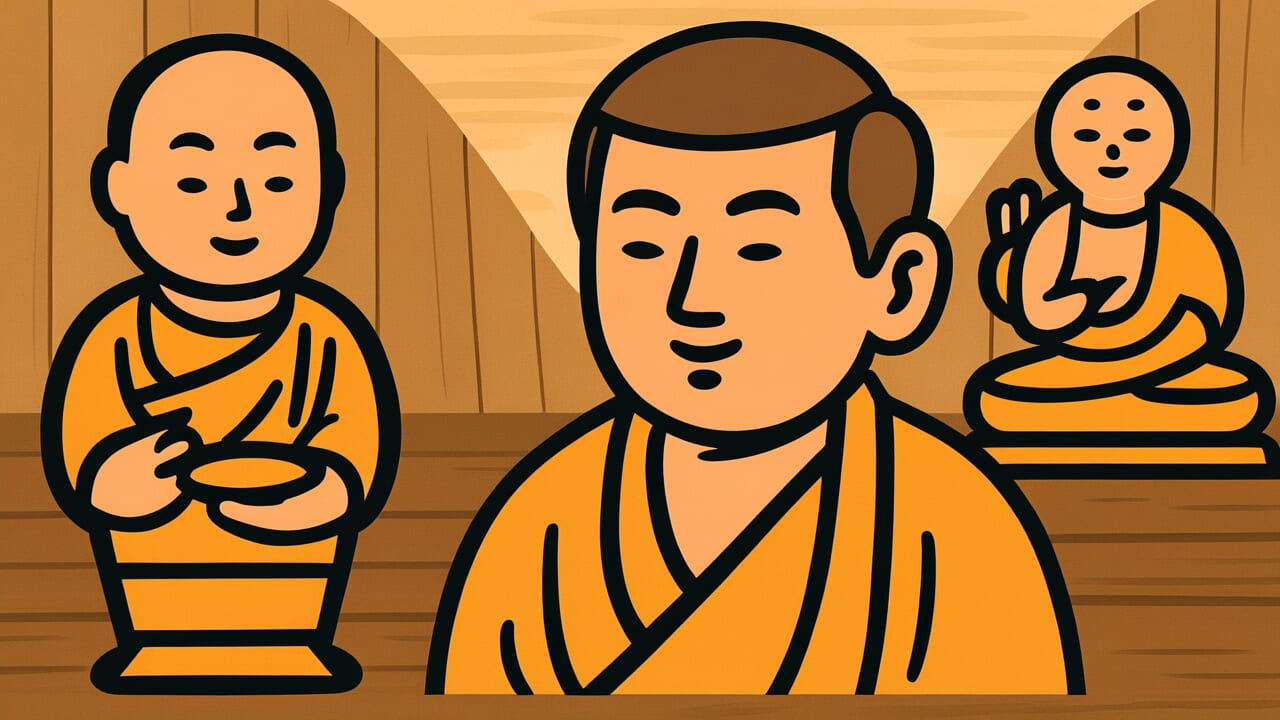How to Read “With money, even a wooden Buddha turns its face”
Zeni areba kibutsu mo tsura wo kaesu
Meaning of “With money, even a wooden Buddha turns its face”
This proverb means that with the power of money, even things that seem impossible become possible.
A wooden Buddha statue naturally cannot move. But the saying suggests that with money, even such a statue would turn its face.
In other words, it would change its attitude. This extreme example shows the tremendous power that money holds.
People use this expression when money dramatically changes someone’s attitude or a situation.
For example, someone who was cold before suddenly becomes kind after getting money. Or a difficult negotiation gets resolved through financial means.
The reason for using this expression is to emphasize money’s overwhelming power. By using the extreme example of an immovable statue, it leaves a strong impression on listeners.
Even today, people use it to express the great influence of money, often with a touch of irony.
Origin and Etymology
The exact first appearance of this proverb in literature is unclear. However, people likely used it widely during the Edo period.
Looking at the structure of the phrase, “kibutsu” refers to a Buddha statue carved from wood.
Buddha statues are originally created as beings that watch over people with compassionate expressions. But in this proverb, the statue “turns its face away.”
A Buddha statue turning its face away is an impossible phenomenon. Yet the saying suggests that with “zeni” (money), even such an impossible thing can happen.
This contains powerful irony.
The Edo period saw commercial development and the deep penetration of a monetary economy into common people’s lives.
People witnessed daily how the traditional class system and human relationships changed through the power of money.
What’s particularly interesting is the choice of an immovable “wooden Buddha” as the example.
Rather than a living person, the expression uses an inanimate Buddha statue. This symbolically shows how absolute the power of money is.
You can feel in these words the perspective of common people who calmly observed such social conditions.
Usage Examples
- That difficult permit application was finally resolved with a donation—with money, even a wooden Buddha turns its face, I suppose
- He suddenly changed his attitude, which shows that with money, even a wooden Buddha turns its face
Universal Wisdom
This proverb has been passed down through generations because it addresses a universal theme: the power of money in human society.
In every era and every place, money has held special power beyond being merely a medium of exchange.
It moves people’s hearts, changes relationships, and makes the impossible possible.
What’s interesting is that this proverb doesn’t simply praise the power of money. Rather, it contains calm observation and irony.
The expression that even an immovable statue would move suggests both awe of money’s power and a critical view of human society being swayed by it.
Humans speak of ideals. They say they value honesty, justice, and principles.
But in reality, these values sometimes waver before the practical benefits of money.
This proverb saw through such human weakness and contradiction.
Our ancestors condensed into these few words a truth about human society that cannot be told through pretty words alone.
At the same time, this proverb contains practical wisdom. It recognizes that moving the world requires not just ideals but realistic means.
You could say it indirectly teaches the importance of understanding and properly utilizing the power of money.
When AI Hears This
Why do attitudes change when money enters human relationships? This can actually be explained by the same principles as energy flow in nature.
In the second law of thermodynamics, when external energy enters a closed system, order collapses toward a disordered state.
For example, when a child enters an organized room, it becomes messy. When energy is injected, the original state cannot be maintained.
Human relationships work the same way.
When money—a powerful energy source—enters, the previously stable “ordered state” of beliefs and loyalty becomes too costly to maintain and collapses.
What’s interesting is that this change is irreversible. Once a wooden Buddha turns its face, it’s hard to return to pure faith even when the money is gone.
This is the same phenomenon as dropping a drop of ink into a glass of water—you can never get back clear water.
The moment money as information enters the system, the number of possible states in human relationships explodes.
In other words, it shifts from simple states like trusting or respecting someone to complex states of calculating interests and comparing gains and losses.
Maintaining morality and beliefs actually requires continuously investing energy to maintain a low-entropy state.
Money has an appeal that easily exceeds that maintenance cost, so people readily “turn their face.”
Lessons for Today
What this proverb teaches modern people is the importance of correctly recognizing the power of money.
The world doesn’t move on idealism alone. When you want to achieve something, you need to understand the importance of money as a realistic resource, not just pretty words.
However, this proverb also contains a warning. The fact that there’s a world that moves with money means you may be at a disadvantage without it.
That’s why building an economic foundation is important for expanding your options and protecting your freedom.
Also, this proverb helps you develop an eye for human relationships.
If people’s attitudes toward you change based on your economic situation, that’s not a true relationship of trust.
By knowing the power of money, you can conversely see the value of genuine relationships that aren’t swayed by it.
Those of us living in modern society are required to have the strength to acknowledge money’s power without being controlled by it.
Money is an important tool, but it’s not everything. This sense of balance is the most important lesson to learn from this proverb.



Comments